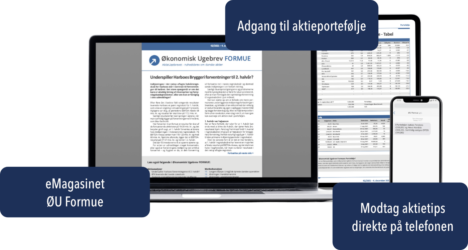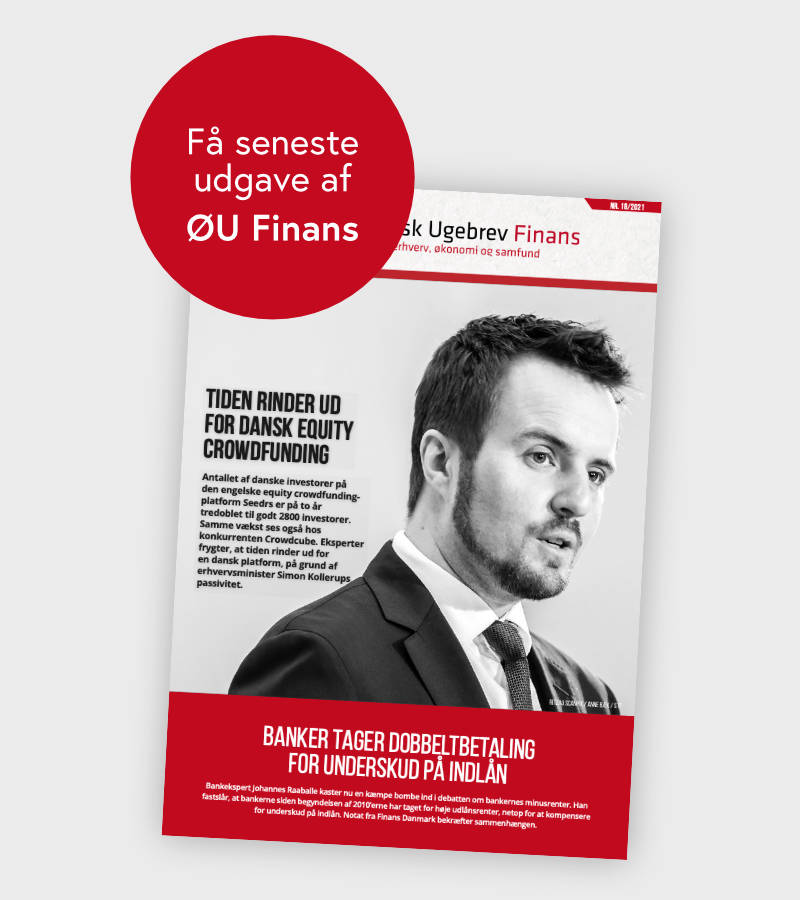Tema om Globale Makro- og Geopolitiske Trends 2020: Året 2020 har alle elementer til at blive det mest usikre år i umindelige tider. Hen over efteråret afblæste mange finanshuse udsigten til en alvorlig global recession i den vestlige verden. Men de seneste må-neders makroøkonomiske signaler viser heller ikke synderlig fremgang. Der er fortsat rigtig mange geopolitiske usikkerheder, der ulmer under overfladen. I Økonomisk Ugebrevs årlige tema om globale trends gennemgår vi her ti analyserapporter fra internationale finanshuse og giver et resumé af, hvordan de ser på året 2020.
Overordnet tegner de store internationale finanshuse et relativt positivt og optimistisk billede af den makroøkonomiske udvikling i 2020. De vigtigste drivkræfter bliver fortsatte stimulanser fra centralbankerne, fortsat langsom tilbagerulning af handelskonflikten mellem USA og Kina og en underliggende tro på fremtiden i erhvervslivet, som også vil forhindre en dyb recession i den vestlige verden. På den anden side er der heller ikke stor tror på, at vi kommer ind i et nyt buldrende økonomisk opsving.
Og der ligger fortsat en masse makroøkonomiske, geopolitiske og finansielle risici under overfladen. Senest har de finansielle risikoindikatorer vist, at de professionelle investorer enten ikke tror på, at det aktuelle finansieringsmiljø rummer de store risici. Eller også føler de sig pressede til at gå meget langt ud af risikokurven for at få gode afkast. Samtidig er det fortsat uafklaret, hvordan udfaldet ender med Brexit, Iran-USA konflikten i Mellem-østen, handelskrigen mellem USA og Kina og senere på året det amerikanske præsidentvalg.
MANGE USIKKERHEDER Om den makroøkonomiske udvikling skriver Citigroup i et outlook for 2020 under overskriften “Back to The Future”, at “advanced economy central banks traveled back in time and returned to their easy monetary policies of the past in order to save their future economic expansions.” Og videre: “Barring a notable re-escalation of trade tensions, we expect the stabilization in manufacturing to lead to a bottoming out of global growth in the first
half of 2020. According to Citi’s economists, global growth should stabilize at around 2.7% year-on-year. In the United States, growth seems likely to advance by about 2.0% year-on-year as weak business investment continues to weigh on growth.”
Credit Suisse skriver i et lidt mere bekymret outlook for 2020 , at ”even if the US-China trade war eases and Brexit uncertainty diminishes, the year 2020 is unlikely to be entirely smooth sailing: a polarized US presidential campaign, margin pressure, high corporate debt, and fewer interest rate cuts by the major central banks – not to mention unexpected political developments – are likely to sporadically test investor nerves. Overall, however, we believe that the global economy and risk assets will continue to show considerable resilience in the face of these challenges. This is the message that the title of this year’s publication, Resilience after all, is intended to capture. While we expect rather subdued economic growth in 2020 and returns that are generally lower than in 2019, a serious market downturn or even financial crisis seems unlikely to us. We observe a number of imbalances in various economies and sectors, but none of them seems serious enough to trigger such a crisis. Conversely, technological progress remains in full force and, importantly, policy makers will continue to provide support.”
FOKUS PÅ PRÆSIDENTVALG
Natixis har spurgt institutionelle investorer, hvordan de ser på 2020. Det er der kommet ti interessante svar ud af. I gennemgangen under overskriften “The Waiting game” handler et af punkterne om den stigende geopolitisk usikkerhed: ”From impeachment in the US, to Brexit in the UK, instability in Bolivia, and a rising tide of populism globally, there has been no shortage of political intrigue for markets to react to in the recent years. Many events produced volatile short-term reactions, but few have delivered lasting impact to investors. In 2020, institutional investors will be watching the US presidential election carefully.”
Videre hedder det, at “overall, 64% project that the US presidential election cycle will result in market volatility. More immediately, 54% believe impeachment proceedings will have a destabilizing effect on the markets. In terms of who wins, institutions are split on the performance outcome. Just over half (52%) think the market will respond favorably to a new US president, while 54% see an unfavorable reaction should the Democrats win both houses of Congress. Elections may present some shortterm performance concerns, but policy may have a longer-lasting impact, as 73% believe trade disputes will have a negative impact on performance.”
Russel Investments skriver om udsigterne for 2020 under overskriften “Cycle, interrupted”, at ”Central bank easing and the cooling in the China-U.S. trade war have set the scene for a global economic rebound in 2020. Our forecast pushes the risk of recession into late 2021, giving equity markets modest upside potential for 2020.”
Finanshuset vurderer, at de største risici i 2020 er følgende: “A re-escalation in the trade war that delivers a fatal blow to global business confidence, investment spending and global supply chains. Central banks resume hiking if they believe the growth risks have passed and inflation pressures are building.”
Om det amerikanske præsidentvalg oplyses det, at ”The U.S. presidential election, where the victory of a progressive Democrat, such as either U.S. Senator Elizabeth Warren or Bernie Sanders, could trigger a policy shift that is negative for corporate profits. Other geopolitical risks such as an escalation of Hong Kong unrest, which triggers an aggressive China response and subsequent global sanctions on China, or actions by Iran that threaten global oil supply.”
Videre hedder det, at “regarding the trade war, our view is that both China and the U.S. have incentives to reach a “phase 1” deal soon. U.S. President Donald Trump would like to declare victory in the trade war ahead of his 2020 re-election bid. He also needs to lift the economic threat that the trade war poses to the near-term outlook.”
DEGLOBALISERING VIL FORTSÆTTE
UBS skriver om udsigterne for 2020 under overskriften The Year of Choices, The Decade of Transformation , at
deglobaliseringen vil fortsætte: “The world is transitioning toward an era of deglobalization with rivalry between the US and China fueling the trend. While policymakers could choose to slow the pace of this transition in 2020, it is unlikely to reverse, in our view. The two countries have made some progress toward hammering out a partial interim trade deal, but their longer term positions are staked out, and we see little to suggest a more substantially conciliatory approach will be adopted even after the US presidential election. The move away from globalization is also occurring beyond the US-China conflict. Brexit is likely to result in greater frictions in UK-EU trade; Japan has taken steps to limit technology exports to Korea; and the US has threatened to impose tariffs on European goods. Elsewhere, controls over foreign ownership on national security grounds are becoming more commonplace.” Morgan Stanley har lidt blandede følelser omkring 2020, I hvert fald investeringsmæssigt: I et outlook for 2020 hedder det: “At first glance, the investment outlook for 2020 should be straightforward. Morgan Stanley economists believe the simultaneous easing of trade tensions and monetary policy will offer a late-cycle lift for the global economy (og) In reality, the picture is distorted by high valuations in many markets, disparate regional cycles and a recovery that relies on continued progress in trade negotiations.”
HANDELSKRIG STILNET AF JP Morgan skriver under overskriften Ghosts of Chrismas past , at “now that worst case trade war outcomes look like they will be avoided , we feel a bit better about the global economic outlook for 2020. Our best estimate is that tariffs and other trade sanctions reduced 2019 S&P 500 earnings growth potential by 7%-8%, and were the primary factors driving global growth from its 4.1% peak in early 2018 to 2.9% by Q3 2019(.) What’s interesting about the US-China trade war: Europe and Japan bore the harsher brunt of it, given their greater reliance on exports and precarious growth trends in the first place. While there wasn’t a GDP growth recession last year, there was an
earnings recession in the US, Europe and Japan. While we expect earnings to rebound in 2020, that’s priced into most equity markets. There’s still plenty of uncertainty about exactly what was agreed to and whether the two sides will agree on enforcement provisions, creating risks that the Trade War reignites again in 2020.”
Selvom de seneste PMI-data ikke har været overbevisende, er der en underliggende optimisme hos de fleste finanshuse: ”We expect a modest growth and profits rebound in 2020 (outside of Japan), in part due to a surge in coordinated central bank easing which typically leads to a manufacturing boost 7-9 months later. Emerging Market central banks are an important part of this process. EM inflation has reached an all-time low of 3.5%-4.0%, indicating that EM central banks have more room to ease if necessary. A modest upturn in global new orders combined with a decline in the inventory overhang suggests improved growth in 2020, and as shown on the prior page, manufacturing surveys are already picking up in the US and China.”
VILDE SCENARIER
Traditionen tro har en stribe cheføkonomer det med at komme med ”vilde forudsigelser” for det kommende år:
Blackstones viceformand, legendariske Byron Wien, ser blandt andet følgende udviklinger i 2020: ”The economy disappoints the consensus forecast, but a recession is avoided. Federal Reserve Chair Powell lowers the Fed funds rate to 1%. Without a comprehensive trade deal in hand, President Trump exercises every executive authority he has to stimulate growth and ward off recession. He cuts payroll taxes to put more money in the hands of consumers.”
Videre hedder det om det kommende amerikanske præsidentvalg: “Concepts of inequality and climate change become important election themes, but centrist ideas prevail. The House of Representatives sends articles of impeachment to the Senate, but Donald Trump is not convicted or removed from office. Enough information is revealed in the proceedings to cause some of his supporters, as well as many independents, to throw their support to liberal candidates in 2020 state races. The Democrats take the Senate in November.”
RENTESTIGNINGER FRA ECB?
Steen Jakobsen fra Saxo Bank er heller ikke bleg for at komme med sine vilde bud. Han forudser blandt andet, at ECB-chef Christine Lagarde vil komme de europæiske banker til undsætning ved at øge de korte renter: ”European banks on the comeback trail as the EuroStoxx bank index rises 30% in 2020.Despite the recent introduction of the tiering system, which has helped to mitigate the negative consequences of negative rates, banks are still facing a major crisis. They are confronted with a challenging economic and financial environment: marked by structurally ultra-low rates, an increase in regulation with Basel IV — which will further reduce the banks’ ROE — and competition from fintech companies in niche markets. In an unprecedented turn of events, in early January 2020, the new president of the ECB, Christine Lagarde — who has previously endorsed negative rates — executes a volte-face and declares that monetary policy has overreached its limits. She points out that maintaining negative deposit interest rates for a longer period could seriously harm the soundness of the European banking sector.”
Intro-pris i 3 måneder
Få unik indsigt i de vigtigste erhvervsbegivenheder og dybdegående analyser, så du som investor, rådgiver og topleder kan handle proaktivt og kapitalisere på ændringer.
- Fuld adgang til ugebrev.dk
- Nyhedsmails med daglige opdateringer
- Ingen binding
199 kr./måned
Normalpris 349 kr./måned
199 kr./md. de første tre måneder,
herefter 349 kr./md.
Allerede abonnent? Log ind her














